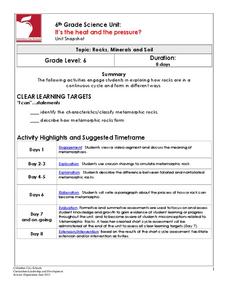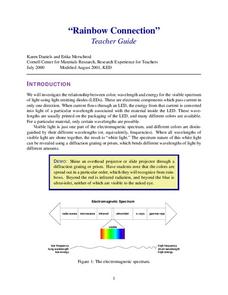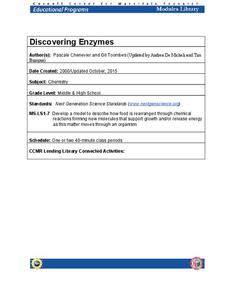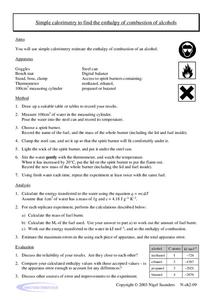Curated OER
Note Taking And Skills And Lab Reports
Pupils perform simple and fun experiments to use the scientific method, take careful notes, and write a lab report. They first make and test a hypothesis about how many drops of water they can fit on the face of a penny and then test...
Curated OER
Vector Lab
Here is a math lab that helps young mathematicians understand the real-life meaning for vector addition. By building a model using spring scales and washers as weight, and then calculating the vector addition using two different methods,...
Curated OER
Celery Lab
How do sugar and salt affect celery's mass, width, and flexibility? Using simple household ingredients, young scientists will perform a controlled experiment to find out. The lab is scaffolded through a worksheet, but there are no other...
Curated OER
Density of a Paper Clip Lab Review
Even though this assignment is brought to you by Physics Lab Online, it is best used as a math practice. Middle schoolers calculate the range, mean, mode, and median for a list of eight different paper clip densities. They analyze...
LABScI
Botany: The Plant Dissection Lab
Study everything about plants! The 12-part series of lessons continues with an examination of many aspects of plants. Components of the laboratory activity address the growth and structure of plants by evaluating familiar plants. The...
Chicago Botanic Garden
Leaf Litter Ecology Lab
Some organisms spend their entire lives in leaf litter. The third in a series of six is a great lesson exploring the community of leaf litter. Groups gather and then spread leaf litter over white paper and remove leaves/twigs while...
Teach Engineering
Hydrogen-Oxygen Reaction Lab
High schoolers conduct an experiment using the reaction of hydrogen and oxygen. After pairs balance the chemical equation for making water, they mix different ratios of hydrogen and oxygen in a chemical reaction. Classmates...
Benjamin Franklin High School
Saxon Math: Algebra 2 (Section 1)
This first of twelve algebra 2 resources provides a broad review of many algebra 1 concepts through a number of separable lessons and labs. Starting with the real number system and its subsystems, the sections quickly but thoroughly move...
Teach Engineering
Chromatography Lab
Groups use alcohol and chromatography paper to separate the color components of black ink. The purpose of the activity is to allow the class to become aware that mixtures exist in hidden places.
Columbus City Schools
It's the Heat and the Pressure?
Ready for a change? Give a comprehensive collection of metamorphic materials a try! With the assortment of printables and lab activities, you won't be under pressure to keep things lively. The unit culminates by having pupils complete an...
Royal Society of Chemistry
Chemistry Masterclass—Chemistry Outreach
Immerse your chemistry class in the world of organic chemistry! Science scholars isolate acetaminophen from an over-the-counter sample during an intense and interesting lab. Groups use many different separation and analysis techniques to...
Chemistry Collective
Virtual Lab: Determining Stoichiometric Coefficients
Investigate the reaction between four unknown substances using a virtual activity. Eager chemists examine the reaction between the four solutions to build a stoichiometric equation. The virtual workbench provides the tools necessary to...
Chemistry Collective
Virtual Lab: Stoichiometry and Solution Preparation Problem
Wow your classes with lesson that has a little of this and a little of that! Young chemists test their stoichiometry skills using a virtual laboratory setup. Using reaction information, they work to create a chemical reaction in which...
New Mexico State University
Lab 6: Kepler's Laws
A 15-page package thoroughly teaches your physics or astronomy learners about Kepler's three laws of planetary motion. Each one is stated and explained. Class members answer questions, solve problems, and participate in the classic...
LABScI
Acoustics: The Sound Lab
If the delay between a sound and its echo is less than 1/10th of a second, the human ear can’t distinguish it. Through the use of a Slinky, rubber band guitar, and straws, scholars explore where sound comes from and how it travels. Whole...
LABScI
Atomic Structure and the Periodic Table of Elements: The Secret Agent Lab
Food always gets attention! Model atomic structure using fruit loops to represent the subatomic particles. After building models, scholars create ionic bonds using their models. Finally, they use these concepts to create a periodic table.
Cornell University
LEDs Rainbow Connection
View LED lights through the eyes of a scientist. Young scholars learn to view light as a wave frequency and connect various frequencies to different colors on the light spectrum. A lab activity asks groups to measure the frequency of...
Cornell University
Discovering Enzymes
Explore the function of enzymes through a series of lab investigations. Learners use household enzymes such as hydrogen peroxide to model the role of enzymes. The enzymes break down proteins with and without a catalyst.
Royal Society of Chemistry
Aspirin—The Wonder of Medicine
What do aspirin and the willow tree have in common? Scholars of chemical synthesis engage in a fascinating reaction to make their own aspirin samples. The lab uses thin layer chromatography analysis, includes stoichiometric calculations,...
Royal Society of Chemistry
A Reversible Reaction of Hydrated Copper (II) Sulfate
How can removing water change the color of a substance? Lab partners remove the water of crystallization from hydrated copper (II) sulfate, record their observations, then rehydrate the solid. The resource is printable and contains ideas...
DiscoverE
Building with Biology
Seeing is believing! Bring DNA to life for young biologists using a simple extraction lab. Individuals extract the DNA from wheat germ, then place it in a microcentrifuge tube for observation. They thread yarn or other material through...
Physics Classroom
As the Crow Flies Lab
A simple, yet memorable, way of practicing with displacement vectors is described here. Divide your class into groups and assign each a different landmark on campus. They measure smaller legs of the path from the classroom to their...
Curated OER
Reactivities of the Group 7 Elements (The Halogens)
During this lab activity, chemists discover the reactivities of chlorine, bromine, and iodine as examples of the halogens. They use a displacement reaction as a test by adding other compounds and observing for a color change. The lab...
Curated OER
Simple Calorimetry to Find the Enthalpy of Combustion of Alcohols
Accomplished chemistry learners set up a calorimeter and measure the energy released by various alcohols: methanol, ethanol, and either propanol or butanol. Lab masters will first need to design their own tables for recording data....
Other popular searches
- Lab Safety
- Biology Lab
- Diffusion and Osmosis Lab
- Lab Equipment
- Science Lab Safety Rules
- Science Lab Safety
- Density Lab
- Photosynthesis Lab
- Lab Report
- Scientific Method Lab
- Biology Lab Photosynthesis
- Microscope Lab

























